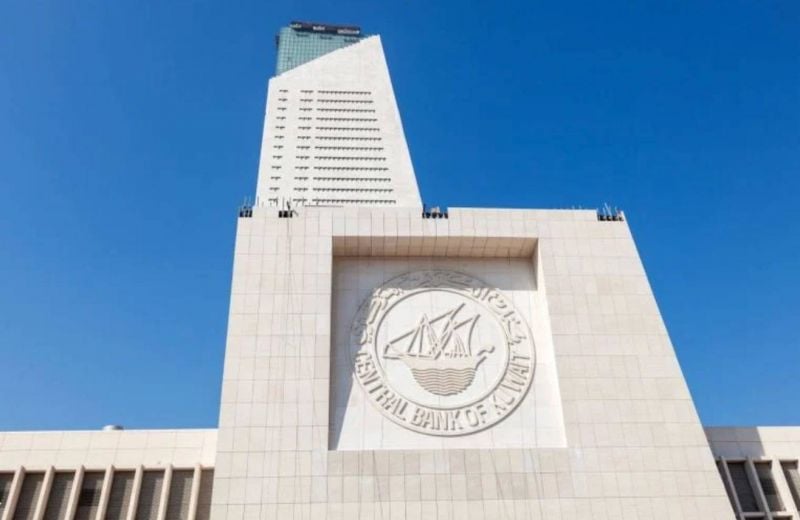
The headquarters of the Central Bank of Kuwait. (Credit: p.lange/Bigstock/file photo)
Cryptocurrencies are now banned in Kuwait. The country decided to strictly prohibit any form of transaction involving “digital assets,” including cryptocurrencies.
Although these assets were not legally recognized, the Kuwaiti authorities did not previously prohibit their use. Specialists believe the country was considered one of the best markets for mining activities — a term used to describe the process of validating transactions related to blockchain technologies, on which cryptocurrencies are based.
But those days may be gone. On Monday, Kuwait’s Capital Markets Authority released on its website a decision prohibiting the use of all digital assets. It adopted the definition used by the Financial Action Task Force (FATF), the intergovernmental body to tackle money laundering and terrorist financing, namely “any digital representation of value that can be digitally traded, transferred or used for payment or investment purposes.”
This includes cryptocurrencies like Bitcoin, Ethereum, USTD, as well as non-fungible tokens (NFT).
Prohibition of mining activities
The decision prohibits any use of these assets and their recognition as virtual currencies in Kuwait, whether for payments or investments.
Mining cryptocurrencies is also explicitly prohibited, as is the granting of licenses to carry out business in digital assets.
However, the Capital Markets Authority has not shut the door on Kuwait being able to issue its own virtual assets one day, considering them the only exception to the ban.
The Capital Markets Authority called on Kuwaitis to be “constantly aware of the risks” associated with virtual asset related transactions, in case they are carried out outside the country.
Violators of the decision would be subject to the same sentences stipulated under the Anti-Money Laundering and Combating the Financing of Terrorism law, adopted in 2013, including prison sentences and heavy fines.
Between Monday and Tuesday, Kuwait’s Commerce and Industry Ministry, as well as the Insurance Regulatory Unit, confirmed the ban on the use of virtual assets, referring to the same law when it comes to penalties. According to several regional media outlets, the central bank has followed suit.
The toughest in the GCC
With this decision, Kuwait joined the anti-crypto Arab countries camp. “The Gulf States are split between Saudi Arabia, Bahrain, the United Arab Emirates, and Oman, which allow the use of virtual assets to varying degrees, and between Kuwait and Qatar, which are wary and ban them,” said financial consultant and asset manager Rudy Fares, who has been invested in the field for more than 10 years.
Thanks to its circulars, Kuwait now has even more stringent regulations than Qatar, which banned the use of crypto by banks, as well as in its business hub, the Qatar Financial Center (QFC), nearly five years ago.
“The fact that they have indicated that violators would face the same penalties as those applied for offenses relating to money laundering and terrorist financing means that the authorities want to send out a strong signal,” said Fares.
Fares also pointed out that the divisions among the GCC member states are mirrored globally, with some countries encouraging the development of cryptocurrencies.
Other countries are wary, including Lebanon — whose central bank does not recognize virtual assets, although there is no ban on them. Countries including Egypt, China and India consider it illegal.
“But this picture is not set in stone and could change under the impetus of countries that have a greater influence on this market,” he added.
Fares pointed out that Robert F Kennedy Jr, who is running for the US presidency with the Democrats, is a fervent supporter of Bitcoin and recently suggested to back the dollar with it.
The implementation-related challenge
Will the authorities enforce these new regulations and how? One has to bear in mind that the FATF has criticized Qatar this year for failing to adequately enforce its own regulations.
According to CoinTelegraph, FATF asked Qatar’s central bank to be more proactive in imposing sanctions on virtual asset service providers (VASPs) that defy government bans.
The International Monetary Fund (IMF), which generally calls on authorities to prevent risks posed by the uncontrolled proliferation of crypto assets , recently considered that a ban “may not be effective in the long run.”
This article was originally published in French in L'Orient-Le Jour. Translation by Joelle Khoury.